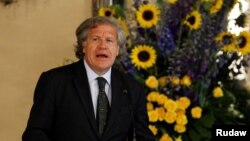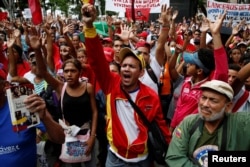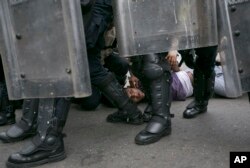Critics of Venezuelan President Nicolas Maduro applauded the Organization of American States leader's call to suspend Venezuela from the group unless the country holds "full general elections as soon as possible," while the nation's socialist government condemned the prospect of foreign intervention.
OAS Secretary General Luis Almagro on Tuesday released a 75-page report accusing Venezuela of violating the rights of its people, including by ignoring the results of 2015 legislative elections and by incarcerating political opponents. Such actions conflict with the standards of the Inter-American Democratic Charter that Venezuela has signed.
"Unfortunately, in Venezuela there is … need for the implementation of the Inter-American Charter," said Carlos Berrisbetia, an opposition lawmaker in the National Assembly. "Why? Because human rights are not respected, the rights of Venezuelans are not respected, freedoms and the constitution have been violated."
But Venezuela's foreign minister, Delcy Rodriguez, scolded the OAS leader as a "sad evildoer."
"Almagro, a known enemy of the people of Venezuela, has forged false assumptions against the republic with the sole objective of encouraging international intervention ... heightening the economic war," the AFP news agency reported her as saying.
Venezuela in 'crisis'
In a letter accompanying the report to the OAS governing body, the Permanent Council, Almagro said his findings updated a report submitted last May. Since then, Venezuela has spiraled "further and further into its acute economic, social, political and humanitarian crisis," he wrote in urging OAS intervention.
OAS could suspend Venezuela if at least 22 of the group's 34 active member states agree. A vote has not been scheduled.
Oil-rich Venezuela for years doled out petroleum to some of its neighbors at minimal cost, engendering goodwill. But some of that may have ebbed as the country's fortunes plunged along with oil prices in 2014.
"We are not yet sure how the countries' representatives will behave at the time of the [OAS] vote," said Jaime Aparicio, who served as Bolivian ambassador to the United States from 2002 to 2006. While "Brazil, Argentina and Peru have already expressed criticism of the system in Venezuela and their support to the Venezuelan people," he said some poor Caribbean nations were less predictable.
The rise of some right-leaning governments in the region also has diminished support for Maduro. Since becoming president in 2013 after the death of Hugo Chavez, he has charged that Venezuela has been the target of an imperialist, capitalist United States. He has steadily amassed power, taking control of the judiciary and trying to block the National Assembly, as well as stymying efforts for a recall referendum.
Today, "corruption is rampant and the economy is in a free fall," the OAS report says. "There is not enough food, health services are extremely scarce and the humanitarian crisis is at a scale unheard of in the Western Hemisphere. Civil and political rights are ignored, all for the sake of preserving the wealth, privilege and impunity of those holding onto power."
Power of 'isolation'
A vote to suspend Venezuela from the OAS would force accountability, bringing in "other observers and other actors from around the region" to help the country work toward democratic reforms, said Ben Raderstorf, an analyst with Inter-American Dialogue, a U.S.-based center.
Suspension wouldn't bring measures such as economic sanctions, he noted.
"The real power is in the isolation," Raderstorf explained. "It's in the strong statement that a large majority of countries around the hemisphere are condemning Venezuela and are committing their democratic pressure to a shared goal. … This is a powerful diplomatic tool."
The OAS report represents a broadening acknowledgement of Venezuela's slide from democracy, said Angel Medina Davis, president of the Latin American Parliament, Venezuela chapter.
It is not only the OAS that "remains impatient, remains concerned about what is happening in Venezuela," Medina said. "... The different chancelleries of Latin America have been raising their protests and their concern."
He also noted Venezuela's December suspension from the South American regional economic bloc Mercosur for failing to address human rights and trade standards in its national laws.
Venezuelan elections for state governors were set for late 2016 but postponed and not yet rescheduled, while the country's presidential election is to take place in December 2018.
VOA Spanish Service's Gioconda Tapia Reynolds contributed to this report from Washington.







